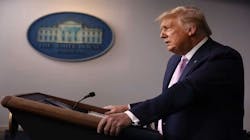Trump threatens 200% tariff on drug imports to get pharma companies to reshore
President Donald Trump on Tuesday threatened to impose up to a 200% tariff on pharmaceuticals imported into the United States, as part of his strategy to pressure drugmakers to increase domestic manufacturing of medicines.
Trump said in Tuesday’s Cabinet meeting at the White House that his administration will make an announcement “very soon” regarding tariffs on drugs imported into this country. However, he added that pharma manufacturers will have a grace period of at least a year to move their manufacturing operations to the U.S. before the levies go into effect.
“We’re going to give people about a year, year and a half to come in and after that they’re going to be tariffed,” Trump said. “They’re going to be tariffed at a very, very high rate — like 200%. We’ll give them a certain period of time to get their act together.”
Commerce Secretary Howard Lutnick told CNBC after the Cabinet meeting that details on pharma-specific tariffs “will come at the end of the month.”
In April, the Trump administration launched an investigation into whether the importation of certain pharmaceuticals and pharmaceutical ingredients may threaten U.S. national security. Initiated under Section 232 of the Trade Expansion Act of 1962, the Department of Commerce probe is looking into the feasibility of increasing domestic capacity for pharmaceuticals and pharmaceutical ingredients to reduce import reliance, and whether tariffs are necessary.
“With pharmaceuticals and semiconductors, those studies are being completed at the end of the month, and so the president will then set his policies then, and I’m going to let him wait to decide how he’s going to do it,” Lutnick told CNBC.
The Pharmaceutical Research and Manufacturers of America (PhRMA) in its recent public comments urged the Department of Commerce to focus its probe on “targeted strategic national security concerns, rather than imposing tariffs on innovative medicines that would not advance the Administration’s goal of enhancing national security nor address the trade barriers faced by the industry in foreign markets.”
PhRMA emphasized that tariffs “are not the answer for promoting greater domestic production of these products” and that the industry already has a strong U.S. manufacturing presence and is making “major investments” that tariffs “would jeopardize.”
Despite recently pledging billions of dollars in U.S. investment, Big Pharma executives over the past few months have made the case that tax policy, not tariffs, are the most effective way for Trump to bring pharmaceutical manufacturers back to the U.S.
Eli Lilly CEO Dave Ricks said his company — which announced a $27 billion investment to build four new U.S. pharmaceutical manufacturing sites — supports the Trump administration’s goal of bringing pharma manufacturing back to this country but doesn’t believe tariffs are the “right mechanism” for reshoring.
Danish drugmaker Novo Nordisk has so far refrained from making such high-dollar public commitments to investing in the U.S., while strongly urging the Department of Commerce in its probe to not recommend the imposition of industry-specific tariffs.
“Tariffs on imports of Novo Nordisk’s products and the inputs on which its U.S. manufacturing operations rely will result in severe supply chain disruptions and market instability,” the company warned, noting that over the past decade it has invested more than $24 billion in the U.S. to expand manufacturing capacity and R&D “facilitated by the corporate tax policy implemented through the 2017 Tax Cuts and Jobs Act.”
Last week, Congress passed the One Big Beautiful Bill Act (OBBBA), which Trump signed into law. While Trump has wielded tariffs as a policy tool to pressure companies to invest in U.S. manufacturing, the new law could prove more of an incentive for domestic investment. Among OBBBA’s provisions are that companies can fully and immediately deduct the cost of building new manufacturing facilities in the U.S.
